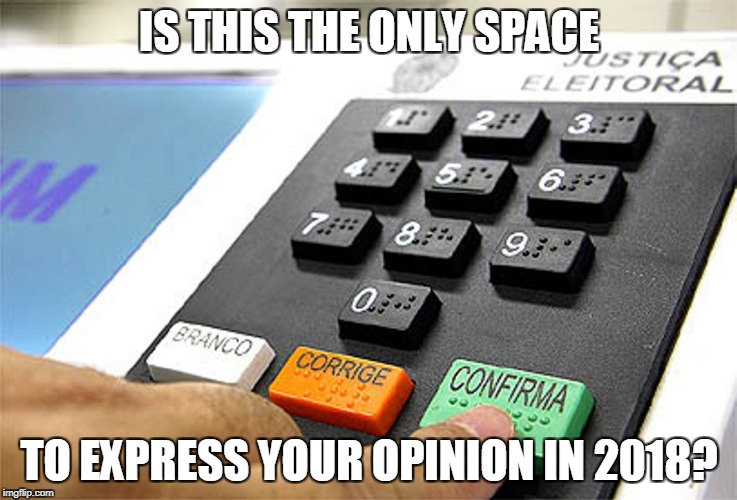
2018 Elections: what will you be able to say on the Internet?
With the 2018 presidential dispute coming closer, the political reform is one of the topics that most mobilized Congress over the last few weeks. With the steep increase in the use of Internet platforms for the political debate and the consumption of information, the use of the web as a campaigning tool has been the subject of intense debating.
One of the novelties brought by the political reform that passed in Congress was the inclusion of a provision that forced Internet platforms to suspend any content considered as “offensive” by parties or candidates until there would be more information about the real identity of its author. In theory, Congressmen were worried about the effects that defaming content could have on the electoral competition, that is, their concern was of restraining “dirty campaigning” practices. In practice, the measure could represent a serious threat to the citizens’ freedom of speech: who would feel comfortable to send a copy of their ID everytime they would make a criticism to a candidate or party on the Internet?
The polemic provision was suppressed by President Michel Temer after being pressured by various sectors. This is not the first time that the Legislative tries to introduce measures that would enable the removal of content from the Internet, as it is the case of the bills 215/2015 and PL8443/2017, which provide a kind of generic “right to be forgotten”, and of the bill 8592/2017, that proposes the criminalization of sharing fake or “harmfully incomplete” information.
Propositions with these generic components expand breaches that can be explored by the political class itself to undermine its critics and, thus, take the control over the political debate. When they appeal to the judiciary, politicians can still use a series of strategies to fight for the removal of content or constrain their critics by demanding the paying of an indemnity, for instance. In these cases, it is up to the Judiciary Branch to act rigorously to curb removal requests that can represent any kind of censorship to the political criticism. But this is not always what happens.

An example is a case involving João Dória’s campaign for Mayor of São Paulo. During 2016’s electoral period, his coalition “Acelera São Paulo” filed an electoral complaint against Facebook and the controller of the profiles “João Escória” and “João Dólar Junior”. The complaint demanded the removal, by the Electoral Justice, of the profiles from the Internet — already as an injunction — and the imputation of a fine to the responsible for the posts on the profiles. The coalition argued that the montages attacked Dória’s honor, like the image of the Mayor accompanied by a pile of trash, or associated with the sayings “I do not have patience for poor people” and “holy mother of caviar, this can only be Alckmin’s water” (in reference to a photo in which he appears drinking latte in a glass cup).
The electoral judge who assessed the case considered that the profiles were disrespectful to João Dória’s “subjective honor and, mainly, his objective honor”, which is especially problematic considering that this happened during the electoral campaign. The content should be removed as it was harming his reputation and, thus, his performance at the elections. The judge then determined the exclusion of the profiles and the paying of a fine to the responsible for its administration, after Facebook handed the data that would allow their identification.
This decision was recently confirmed in the court of appeals of the electoral justice that upheld the exclusion of the profiles and the payment of the fine of R$5.000,00. The argument is that the content published “does not leave any doubt that there were criticisms to the candidate to the Mayor’s office”, which by itself reveals the “negative electoral character”.
When ignoring the fact that humor is one of the most poignant forms of political criticism — and, in this sense, protected by freedom of speech –, this line of interpretation of the electoral and civil legislation curbs the participation of citizens in the electoral debate. More than this, it aims to protect an old-fashioned way of campaigning, in which only candidates had the conditions to fully participate in the debate, and is far from the evident advantages that the Internet platforms brought to the democratic process. Especially during the campaigning period, politicians should be exposed to the scrutiny and the criticism of voters, from the friendly to the more caustic ones.
The Internet has indeed transformed political campaigning around the globe. In the US and in France, it is estimated that the social networks had a determining role for the result of the elections. On the platforms that privilege content sharing, like Facebook and WhatsApp, there are growing concerns about the automated mechanisms for the dissemination of fake information, that could compromise the integrity of the electoral campaigns.
Amidst the debate about fake news, “dirty” campaigning and manipulation of the voters’ opinion, the role of the right to freedom of speech as a basic component of democracy cannot be forgotten. In order to defend it, it is also necessary to guarantee the autonomy and the capacity of citizens to manifest themselves politically. Afterall, what is the use of protecting the honor of candidates and the competitiveness of parties is this means to shield the political debate from criticism?
By Dennys Antonialli and Thiago Oliva
Translation: Ana Luiza Araujo